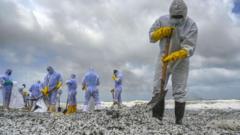GEDDES, N.Y. (AP) — Long before white settlers arrived at Onondaga Lake and the city of Syracuse encroached upon its shores, this waterbody held sacred significance for the Onondaga Nation. The contemporary pollution issues that plague the lake starkly contrast its historical importance, leading local leaders to advocate for returning a parcel of the lakeshore to the Nation.
Despite this desire, negotiations have stagnated for over 14 years, grappling with tax implications and the lake’s ongoing cleanup process. A recent debate surrounding a statue of Christopher Columbus adds further complications, inciting frustration among both the local officials and the Onondaga Nation.
Nation member Betty Hill poignantly remarked, “It’s not called Onondaga Lake for some arbitrary reason. They know that it belonged to us, they know that it was part of our history for thousands of years.”
Sacred, Yet Polluted
Onondaga Lake stands as a historical symbol, associated with the Peacemaker and the formation of the Haudenosaunee Confederacy, which many believe influenced the United States Constitution. However, the lake’s beauty has been tainted over the years due to industrial contamination, leaving it as one of the most polluted lakes in the United States. While restoration efforts have provided some improvement, the area remains compromised, with advisories against consuming its fish.
Sid Hill, the nation’s chief, conveyed the lake’s significance, stating it remains “a living relative to our people,” underlying the spiritual and cultural practices that rely on its shores.
Tensions regarding the land transfer have been exacerbated by the unresolved presence of the Columbus statue, which many Onondagas perceive as a symbol of colonial oppression. Despite plans for its removal by Syracuse's mayor in 2020, opposition from supporters of the statue has stymied any potential progress, intertwining the fate of the statue with discussions about land reclamation.
As negotiations remain tenuous, Onondaga leaders emphasize their unwavering commitment to reclaiming their heritage and pressing forward in their quest to restore their relationship with the land.



















